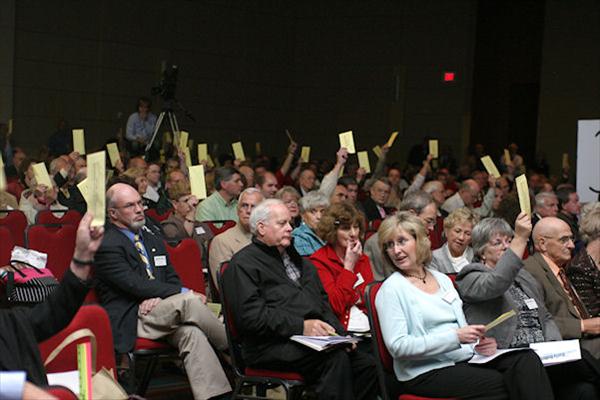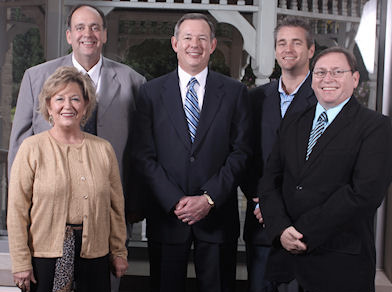At their annual meeting in Columbia Nov. 10-11, South Carolina Baptist Convention messengers adopted a streamlined budget, weighed in on legislative issues ranging from healthcare reform to legalized gambling, and elected a president who predicts the denomination “is not going to be the way it used to be.”
 Messengers vote during the Tuesday afternoon business session.
Messengers vote during the Tuesday afternoon business session.Before the meeting adjourned at noon on its second day, 1,080 messengers had registered for the state convention’s 189th annual meeting. Outgoing SCBC president Rudy Gray presided over business sessions and worship times inside the Columbia Metropolitan Convention Center even as the blustery remains of tropical storm Ida drenched the capital city.
Shrinking budget
After considering and rejecting a motion from the floor to tap the SCBC’s contingency reserve fund in order to maintain the convention’s operating budget at last year’s levels, messengers approved a budget of $32,180,000 – a 6 percent reduction from a year ago.
The 2010 budget includes a 5.67 percent across-the-board reduction for SCBC-affiliated institutions (three universities, Ministries for the Aging, Connie Maxwell Children’s Home, the Baptist Foundation and The Baptist Courier) as well as SCBC Cooperative Program ministries. In addition, SCBC employees will not receive a cost-of-living wage increase.
Dennis Wilkins, chairman of the SCBC Executive Board’s budget, finance and audit committee, told messengers that the percentage of undesignated gifts from churches to be sent to the Southern Baptist Convention will remain at 40.44 percent.
He said if state CP gifts in 2010 exceed the budgeted amount, excess funds will be allocated as follows: International Mission Board, 55 percent; North American Mission Board, 25 percent; and mission scholarships for South Carolina participants in mission trips, 20 percent.
Wilkins said CP giving in South Carolina was down about 6 percent through August. “We do not foresee any turnaround in the economy,” he added.
Resolutions
Messengers adopted a slate of resolutions ranging from opposition to federal hate crimes legislation to a call for restoring the practice of church member discipline. (Full-text versions of the resolutions can be found at the SCBC Web site.)
Following is a brief summary of the resolutions, which were approved with little discussion:
? National Healthcare Reform – The resolution calls for Congress to “exert every effort – to see that language is used that eliminates any vagueness in terminology and closes any possible loopholes that might be used later to approve public funds for abortion, intrusive family planning recommendations, and end-of-life counseling under the proposed healthcare reform.”
? Homosexuality and Military Service – Messengers approved a resolution supporting the current military code, which bars the practice of homosexuality in the military. The resolution calls on President Obama not to abandon the “don’t ask, don’t tell” policy currently in effect. The resolution encourages “speaking candidly to the culture and acting redemptively toward individuals.”
? Regenerate Church Membership and Church Member Restoration – The resolution exhorts SCBC churches “to repent of the failure among us to live up to our professed commitment to regenerate church membership and any failure to obey Jesus Christ in the practice of lovingly correcting wayward church members.” The resolution further encourages the implementation of scriptural teachings on church discipline even if the result is a reduction in the number of church members reported in annual profiles.
? Gambling in South Carolina – Citing “recent economic chaos” that may contribute to a “vulnerability of false hope” and the expansion of gambling activities by non-profit groups as fund-raising events, the resolution calls on state legislators to vote against bills that would expand or support new or existing gambling venues. The resolution also calls on the Catawba Tribe of York County to forgo opening a bingo venue.
? Hate Crimes Legislation – The resolution asserts that federal hate crimes legislation “could effectively kill” freedom of speech by “criminalizing any verbal opposition to homosexuals and/or their lifestyle” and calls on Congress to repeal recently passed legislation. The resolution also calls on Americans “to avoid acts of hatred and violence toward lesbian, gay, bisexual, and transgendered persons.”
? Call to Prayer for Gov. Mark Sanford – The resolution asks South Carolina Baptists to pray for South Carolina Gov. Sanford and the restoration of his marriage and family. The resolution also calls “all leaders of our state and nation to a high standard of moral fidelity, especially with regard to their marriages and families.”
? Appreciation – Messengers adopted resolutions of appreciation for Weldon Fallaw, retiring president of the South Carolina Baptist Foundation; Morris Chapman, retiring president of the Southern Baptist Convention Executive Committee; Jerry Rankin, retiring president of the International Mission Board; the City of Columbia; and the staff of the SCBC and its committee chairmen and members.
Officers elected
Fred Stone, pastor of Pickens First Baptist Church, was elected SCBC president for 2010. Messengers chose Stone, 53, over Abbeville pastor Kile Antone, 36. Stone received 58.6 percent of the total 431 votes cast.
 SCBC officers for 2010, from left: recording secretary Linda Hite, Redbank Baptist Church, Lexington; registration secretary Quinn Hooks, Evergreen Baptist Church, Effingham; president Fred Stone; second vice president Brad Atkins, First Baptist Church, Powdersville; and first vice president Dusty Bradshaw, Hillcrest Baptist Church, North Charleston.
SCBC officers for 2010, from left: recording secretary Linda Hite, Redbank Baptist Church, Lexington; registration secretary Quinn Hooks, Evergreen Baptist Church, Effingham; president Fred Stone; second vice president Brad Atkins, First Baptist Church, Powdersville; and first vice president Dusty Bradshaw, Hillcrest Baptist Church, North Charleston.Other newly elected SCBC officers included: first vice president Dusty Bradshaw, Hillcrest Baptist Church, North Charleston; second vice president Brad Atkins, First Baptist Church, Powdersville; recording secretary Linda Hite, Redbank Baptist Church, Lexington; and registration secretary Quinn Hooks, Evergreen Baptist Church, Effingham.
While acknowledging in an Oct. 20 Baptist Courier article that the SCBC is among the healthiest state conventions, Stone also said “change is happening” in South Carolina.
“Denominations are declining,” he said. “We can’t keep on doing what we’ve always done. It’s time for us to carefully evaluate what we are doing, find out what is working and what is not, and then make whatever changes are necessary to make our convention more effective in serving churches. (See more in related story at ???.)
Stone, whose church gives approximately 14 percent of undesignated offerings to the Cooperative Program, said he supports a “united effort” to fund convention work by encouraging churches to “give generously” through the Cooperative Program. In the face of declining denominational involvement, Stone said “we must demonstrate reasons why individuals and churches should be involved in a denomination, as opposed to their doing ministry and missions on their own.”
Ralph Carter Jr., pastor of Brushy Creek Baptist Church, Taylors, placed Stone’s name in nomination. He called Stone a humble and gifted leader who “never waffles in his conviction.”
Stone has served as a pastor in South Carolina for 27 years. He previously served at Cornerstone Baptist, Clinton; Utica Baptist, Seneca; and First Baptist, Mayo.
He is a graduate of Clemson University (B.A.), Southwestern Baptist Seminary (M.Div.) and Reformed Theological Seminary (D.Min.).
He and his wife Lisa have two grown sons and one grandson.
Floor motions, awards, other business
Messengers approved a motion from the floor instructing the Executive Committee not to employ outside business consultants until the economy rebounds. Former SCBC president Mike Moody, pastor of Honea Path First Baptist Church, presented the motion. Messengers rejected a motion from Moody to tap the convention’s contingency reserve fund in order to restore the 2010 budget to 2009 levels.
Messengers rejected two floor motions from former SCBC president Wayne Dickard, pastor of Northbrook Baptist Church, Boiling Springs. In his first motion, Dickard asked for implementation of a policy that would require every employee of the SCBC be a member of a Southern Baptist church. Dickard’s second motion called for a study to determine the feasibility of having the SCBC president also serve as chairman of the SCBC Executive Board.
The Executive Board approved a recommendation made at the 2008 meeting to evaluate the feasibility of a multi-site annual meeting and will give a report at the 2010 annual meeting. A second recommendation from the 2008 meeting was to research the creation of a residential care facility for developmentally disabled adults. A study committee will report at the 2010 meeting.
Messengers approved a change to the convention’s bylaws that would allow the chairman of a standing committee to consider any committee member who misses three consecutive meetings to have resigned.
Outgoing SCBC president Rudy Gray noted that of his 15 appointments to the Committee on Committees, eight are under the age of 40.
Weldon Fallaw, retiring president of the Baptist Foundation of South Carolina, was presented the Order of the Palmetto, the highest civilian award presented by the governor’s office, by state Sen. Nikki Setzler. “Your life is a shining example of a gentleman who considers it a shining advantage to serve others,” Setzler told Fallaw during the presentation.
Josh Kimbrell was presented the E.A. McDowell Award by the SCBC’s Christian Life and Public Affairs Committee. Kimbrell, the youngest-ever recipient of the award, is a 2007 graduate of North Greenville University and is active in the Upstate in cultural life and public policy matters. He founded Christians Empowered and Organized, a roundtable of pastors, political enthusiasts and business leaders.
Chestnut Ridge Baptist Church, Laurens, was presented the Impact Your World Award for its commitment to advance the kingdom of God through action in the public arena. The church, pastored by Tony Crouch, has taken the lead in activities to influence local thought and policy through its Christians in Action ministry.
Gerald Mabry, pastor of Hendersonville Baptist Church, Walterboro, was presented the Outstanding Smaller Church Pastor of the Year Award.
Jamie Murphy, minister of families and outreach at Immanuel Baptist Church, North Augusta, received a special President’s Award from Rudy Gray for the “Parent Project,” Immanuel’s ministry to parents of at-risk youth. Murphy said the 10-week program is a unique opportunity to “build a bridge” between Immanuel Baptist and the North Augusta and Aiken communities.